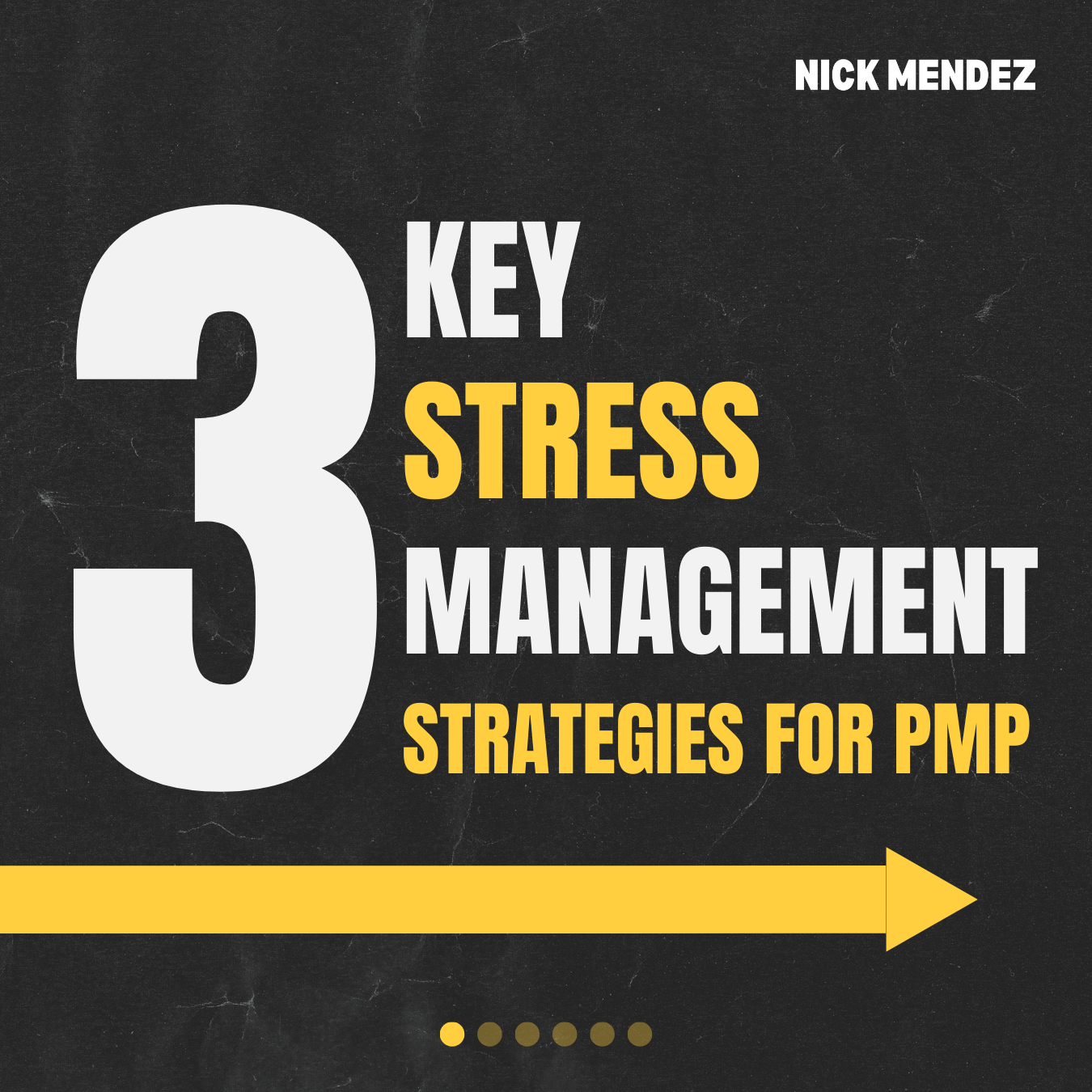3 Key Stress Management Strategies for PMP
Table of Contents

About the Author – About Nicholas Mendez (Nick Mendez):
Nicholas Mendez (Nick Mendez) is a 25-year-old tech professional with 5+ years of project management experience. He earned his PMP certification on April 30, 2023, marking a significant milestone in his career. Since then, he’s written many guest posts and blog posts where readers have received a great amount of value and knowledge to prepare for their PMP exam. Check out his FREE exclusive top-notch PMP study resources at teachmeit.co and nickmendez.co and get ready to take your career to the next level!

Have you ever wondered how project managers keep their cool amidst the chaos of never-ending meetings, deadlines, budgets, and team dynamics? Picture this: a world where every minute counts, where communication is key, and where self-care isn’t just a luxury but a necessity for success. Welcome to the realm of Project Management Professionals (PMPs), where the stakes are high, but so are the rewards.
In this fast-paced environment, effective stress management isn’t just a nice-to-have—it’s essential for both project success and personal well-being. In this article, we are going to explore three key stress management strategies tailor-made for the demanding world of project Managers and especially for aspiring and certified PMPs.
From mastering time management to honing communication skills and prioritizing self-care, we’ve got you covered.
1. Time Management
Time management is the cornerstone of effective project management. It’s all about making the most of your time by prioritizing tasks, breaking them down into manageable chunks, and utilizing the right tools to stay organized and on track. First things first, prioritizing tasks is essential. Start by identifying which tasks are most important and urgent. Ask yourself: What needs to be done first? What can wait? By focusing on high-priority tasks, you can ensure that you’re always tackling the most critical aspects of your project.
Breaking down tasks is another game-changer. Instead of feeling overwhelmed by large, complex tasks, break them down into smaller, more manageable ones. This not only makes them feel less overwhelmed but also allows them to make steady progress without feeling weighed down.
Now, let’s talk about tools. Project management tools and software can be a lifesaver when it comes to staying organized and on top of your tasks. Whether it’s scheduling deadlines, assigning responsibilities, or tracking progress, there are plenty of tools out there designed to streamline the project management process. From popular options like Asana and Trello to more substantial platforms like Microsoft Project or TeamWork, finding the right tool for your needs can make all the difference in keeping your project on course. So don’t be afraid to explore your options and find the perfect tool to help you master time management like a pro.
2. Communication Skills
Effective communication skills are the glue that holds a project team together. From understanding team members’ concerns to resolving conflicts, clear communication is essential for cultivating collaboration and maintaining productivity. Active listening is the foundation of good communication. By truly listening to what others have to say, you can gain valuable insights into their perspectives and concerns. This not only helps to build trust and rapport but also ensures that everyone feels heard and valued. So next time you’re in a meeting or discussing a project with your team, remember to listen actively and attentively.
Open communication is equally important. Creating a culture of openness and honesty within your project team encourages team members to speak up, share their ideas, and express their concerns freely. This fosters a sense of trust and transparency, making it easier to address issues as they arise and collaborate effectively towards common goals.
Conflict resolution is a natural part of any project team dynamic. When conflicts or disagreements arise, it’s important to address them constructively and proactively. Start by acknowledging the issue and encouraging all parties involved to share their perspectives openly. Then, work together to find a solution that satisfies everyone’s needs and interests. By approaching conflicts with empathy and a willingness to compromise, you can maintain team harmony and keep the project on track toward success.
3. Self-Care Practices
Self-care is not just a buzzword—it’s a crucial aspect of maintaining your well-being, especially in high-pressure environments like project management. Here are some simple yet effective self-care practices to incorporate into your routine:
- Take breaks. It may seem counterintuitive when you’re under pressure to keep pushing forward, but taking regular breaks is essential for recharging your batteries and maintaining focus throughout the workday. Whether it’s a short walk, a coffee break, or simply stepping away from your desk for a few minutes, giving yourself permission to pause can make a world of difference in your productivity and overall well-being.
- Physical activity is a powerful way to take care of yourself. Engaging in regular exercise not only helps to reduce stress but also improves mood and increases energy levels. Whether it’s hitting the gym, going for a run, practicing yoga, or engaging in martial arts, finding a physical activity that you enjoy can be a game-changer for both your physical and mental health.
- Mindfulness and meditation practices can work wonders for reducing stress and promoting inner peace. Taking just a few minutes each day to quiet your mind, focus on your breath, and center yourself can help alleviate anxiety and improve your overall sense of well-being. Whether you prefer guided meditation apps, mindfulness exercises, or simply taking a few deep breaths, incorporating these practices into your daily routine can have huge benefits on your mental clarity and emotional resilience.
- Prioritize healthy habits. This includes eating nutritious foods, getting adequate sleep, and maintaining a healthy work-life balance. Fueling your body with the right nutrients, getting enough rest, and setting boundaries between work and personal life are all essential for sustaining long-term well-being. Remember, taking care of yourself isn’t selfish—it’s necessary for being your best self both personally and professionally. So make self-care a priority and watch as your productivity, happiness, and overall quality of life soar.
Put All 3 Stress Management Tips Together & Prepare to Succeed
In the high-stakes world of Project Management Professionals (PMPs), stress management isn’t just a luxury—it’s a necessity. The demands of the role can be intense, with deadlines looming, budgets to manage, and teams to coordinate. Effective stress management isn’t just about staying sane—it’s about ensuring project success and personal satisfaction.
By implementing the strategies outlined here—prioritizing tasks, honing communication skills, and practicing self-care—PMPs can enhance project performance and personal well-being. From mastering time management techniques to nurturing open communication and prioritizing self-care practices, these strategies are essential tools in the PMP’s toolkit.
